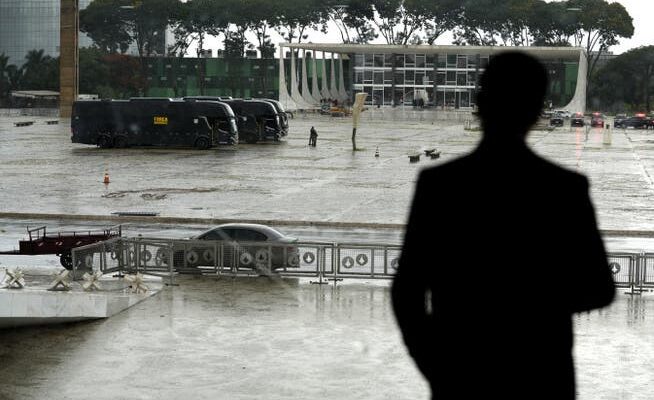After the storming of the government district in Brasilia, the Supreme Court cracked down, suspended the governor, issued an arrest warrant for his security chief and put 1,500 Bolsonaristas in custody. That goes too far for many.
A worker looks out over the plaza in front of Brazil’s Supreme Court, in front of which security forces’ vehicles are parked.
The mob of radicalized Bolsonaro supporters who stormed the government district of the capital Brasilia on Sunday did not stop at the plenary hall of the Supreme Court. In their frenzy of destruction, the Bolsonaristas smashed the window panes and the furniture in the hall. As if with a hunting trophy, they took selfies with a wooden door that had Chief Justice Alexandre de Moraes’s name on it. It came from the locker where the judge keeps his black toga.
For Bolsonaro and his supporters, Alexandre de Moraes is evil personified. The bald judge smashed the presidential clan’s fake news networks during Bolsonaro’s turbulent four years in office. As chief executive of the October elections, he banned campaign material full of fake news and blocked radical Bolsonaristas from accessing their social media accounts. Bolsonaro said several times that he would no longer accept Moraes’ orders, only to row back sheepishly afterwards.
Even after Sunday’s violence, a sort of tropical adaptation of the Jan. 6, 2021, storming of the Washington Capitol, Moraes acted swiftly and ordered the 90-day suspension of the capital district governor. As the chief security officer, Ibaneis Rocha failed, just like his security chief Anderson Torres, Bolsonaro’s justice minister, who Rocha only brought into the new post in early January. Moraes decreed the arrest of Torres on Tuesday.
Criticism of Moraes’ hard line does not only come from radical Bolsonaristas. The Brasilia-based Law and Advocacy Institute IADF said Rocha’s dismissal without investigation violates Brazil’s Magna Carta and contradicts the will of the 830,000 citizens who voted for him in October. The governor of the state of Minas Gerais, Romeu Zema, made a similar statement. The dismissal of his colleague was “premature” and “arbitrary”.
Criticism from within its own ranks weighs particularly heavily. Chief Justice Marco Aurélio Mello, who has been retired since 2021, accused Moraes of acting against “social peace”. If he were still on the Supreme Court, he would not approve of the suspension of Governor Rocha or the arrest of around 1,500 Bolsonaro supporters. “We will not live better here in Brazil with these coercive measures,” says Mello. Not even during the dictatorship (1964-85) was there something like this: “We should act calmly.”
Overall, however, approval of Moraes prevails. “The Supreme Court decided quickly, and in my opinion that was necessary in a crisis situation like this,” explains constitutional lawyer Thomaz Pereira from the Fundação Getúlio Vargas in Rio de Janeiro in an interview. The investigation would show whether the decisions would later prove to be correct and necessary. “But the Supreme Court is trying to guarantee the functioning of state authority.”
Finally, there is a suspicion that Governor Rocha’s remaining in office could facilitate new violent protests and hamper investigations. A majority of the 11 Supreme Court justices backed Moraes on Wednesday. A majority was found for both the suspension of Rocha and the issuance of arrest warrants against ex-Justice Minister Torres and the former head of the Brasilia gendarmerie.
Around 300 people were arrested in the devastated government district on Sunday, and around 1,200 people on Monday in front of the army headquarters in Brasilia. Since Bolsonaro’s election defeat at the end of October against the left-wing former President Luiz Inácio Lula da Silva, they had called on the military there to stage a coup. Her refusal to disband the illegal protest camp on Moraes’ orders justifies her arrest, according to the lawyer Pereira. The call to overthrow the government is also not covered by the right to freedom of expression.
News spread on social networks that those arrested were being treated badly and that an 80-year-old woman had even died in custody turned out to be fake news. Authorities said no minors were arrested. A triage of those arrested is still ongoing. “It remains to be seen which of them will ultimately remain in custody,” said Pereira.
Pereira considers the accusation made by Bolsonaristas that Moraes and the Supreme Court are engaged in legal activism to be inappropriate. This accusation is always made when one side disagrees with decisions. The supporters of Lula da Silva, who now praise Moraes as the savior of democracy, made the same allegations against the Supreme Court a few years ago in the corruption trials against Lula’s Labor Party.
Lula was then imprisoned by a Supreme Court decision. Is Bolsonaro now threatening something similar? If the ex-president is found to be involved in the crimes committed on Sunday and in a coup plot, he too could be arrested, Pereira explains. “After all, he’s a citizen like everyone else.”
